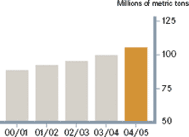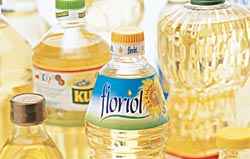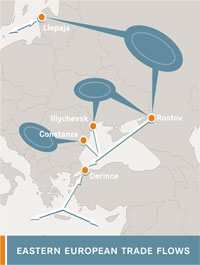 |  |
 |  |
 |  |
global soybean meal
consumption1 |
global vegetable oil
consumption1 |
brazilian npk
fertilizer sales2 |
 With global population, gross domestic product (GDP) and per capita income rising steadily, Bunge's three businesses—agribusiness, fertilizer and food products–are well positioned for growth. With global population, gross domestic product (GDP) and per capita income rising steadily, Bunge's three businesses—agribusiness, fertilizer and food products–are well positioned for growth.
As higher incomes, especially in the developing world, allow people to increase their consumption of meat, the market for soybean meal, the primary protein component in commercial animal feed, should grow. Last year, according to the USDA, the world consumed 130 million tons of soybean meal, up from 118 million in 2000. Future growth is forecast to top four percent per annum.
Demand for vegetable oil should increase at a similar rate. Growth will be particularly strong in China and India. Last year, global consumption reached 100 million tons, up from 89 million tons in 2000.
Total agricultural trade is also expected to increase, as the majority of growth in food consumption occurs away from primary growing areas.
One of these areas, South America, is cementing its position as the world's leading agricultural producer. Both Brazil and Argentina produced large soybean crops in 2004, and their output is expected to grow steadily in coming years.
In Brazil, where most soil is nutrient deficient, production growth brings increased fertilizer use. In 2004, fertilizer consumption was nearly 23 million tons–a 39 percent increase over 2000.
These global trends represent strong growth, but we intend to exceed them. In 2004, we took numerous steps to improve Bunge's positions in the world's fastest-growing and most valuable markets.
In Vietnam, we signed an exclusive throughput agreement with Phu My Port, the leading port for dry bulk cargo in the country. Vietnam is the fastest-growing market for soybean meal consumption in Southeast Asia, a region that has seen a 40 percent increase in demand for the product since 1999 and in which Bunge is the leading importer.
In the U.S., we formed AGRI-Bunge, LLC, a joint venture with AGRI Industries. The partnership links AGRI's crop origination network in Iowa with Bunge's global sales, marketing and logistics. The result is a new source of crops for Bunge and wider market access for AGRI and U.S. farmers.
We also entered the value-added market for cholesterol- reducing phytosterol ingredients by creating a partnership with Procter & Gamble and Peter Cremer North America.

spotlight on eastern europe
Our strategy in Eastern Europe is an example of how Bunge moves to capitalize on high-growth markets.
Eastern Europe is endowed with fertile soil, room for yield and efficiency improvements, and strategic access to growing consumption markets, which together give it the potential to regain its status as one of the world's breadbaskets. The USDA predicts that grain exports from Black Sea nations could rise to a level between 30 and 40 million metric tons per annum by 2013–up from an average of around seven million tons between 1996 and 2000.
The Middle East and North Africa will help fuel this growth. These regions already are large grain importers, and their population and GDP growth rates are above world averages. Their geographic proximity make them ideal export destinations for Eastern Europe.
Efficient logistics are essential to unlocking Eastern Europe's potential. Since the beginning of 2004, we have improved Bunge's position in the region's ports. We built a grain terminal in Liepaja, Latvia; purchased one in Rostov, Russia; and signed throughput agreements with facilities in Iliychevsk, Ukraine, and Constanza, Romania. Together with our existing terminal in Derince, Turkey, these assets and agreements form a network that improves Bunge's ability to handle trade to and from Eastern Europe.
 We also expanded our origination operations by acquiring grain elevators in Ukraine and Romania, and started work on a multi-seed crushing plant in Iliychevsk, Ukraine that will produce crude vegetable oil for export. We also expanded our origination operations by acquiring grain elevators in Ukraine and Romania, and started work on a multi-seed crushing plant in Iliychevsk, Ukraine that will produce crude vegetable oil for export.
Through a joint venture, we purchased Kama Foods and strengthened our crushing and refining operations in Poland. We also broadened our product portfolio by acquiring exclusive rights to Ideal™, a premium sunflower oil brand, in Russia and the CIS states.
1 USDA (represents Oct. to Sept. marketing years; 2004/05 estimated); 2 ANDA
|

